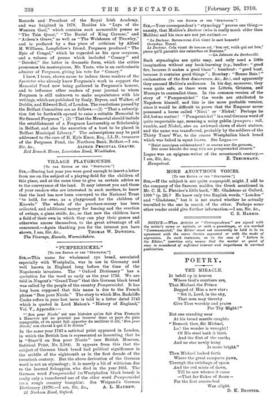[To snit EDITOR OF THE "SeactsToa."1 Sin,—Your correspondent's " etymology
" proves one thing,— namely, that Moliere's Docteur (who is really much older than :Moliere) and his race are not yet extinct:— "Le Docteur. Savez-vous vient le mot bonnet?
Gorgsbus. Nenni.
Le Docteur. Cela vient de bonum est, • bon est, voile qui eat bon,' parce qu'il garantit des catarrhes et flusions."
—La Jalousie du. Earbouille.
Such etymologies are quite easy, and only need a little imagination without any book-learning. (e.g., bonfire : "good'
fire, because it makes a good blaze"; bumboat: "good! boat,
because it contains good things " ; Bombay': "'Bonne Bale ! ' exclamation of the first discoverers, &a., &c.), and apparently'
they amused Moliere's audiences. In his day, moreover, they' were quite safe, as there were no Littresi 'Grimtns, attrr Hurrays to contradict them. In the- common. version of the story of " Pumpernickel " the words are attributed to Napoleon himself, and' this- is' the more probable version; since it would be difficult to prove that the Emperor never possessed a horse called 'Nicol' or Nickel.' Perhaps he did, but no matter ! " Pumpernickel " is a real German word of' quite respectable age, meaning a noisy goblin (puntpera : roll,
rumble, and Nickel), also an awkward clown of short stature, and the name was transferred, probably by the soldiers-of the Thirty Years' War, to the coarse Westphalian black bread
which was baked in squat loaves. See Logau :— " Heist marcipan soldatenbrot? so essens nur die groszen, Der arme knecht der mag sich am pompernickel stoszen."
Logan was an epigram-writer of the seventeenth century.---.










































 Previous page
Previous page